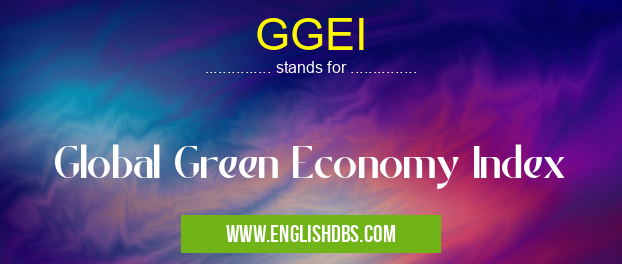What does GGEI mean in
GGEI stands for Global Green Economy Index, which is a comprehensive framework that evaluates the performance of countries in transitioning towards a green economy. This index assesses nations based on various indicators, such as environmental sustainability, economic development, and social equity. GGEI aims to provide policymakers and stakeholders with insights into the progress and challenges faced by countries in adopting sustainable practices.

GGEI meaning in in Governmental
GGEI mostly used in an acronym in Category Governmental that means Global Green Economy Index
Shorthand: GGEI,
Full Form: Global Green Economy Index
For more information of "Global Green Economy Index", see the section below.
» Governmental »
Components of GGEI
The GGEI comprises 30 indicators grouped into 10 sub-indices that measure different aspects of a green economy. These sub-indices cover areas such as:
- Renewable Energy
- Energy Efficiency
- Low-Carbon Transport
- Sustainable Water Use
- Sustainable Land Use
- Green Buildings
- Green Goods and Services
- Green Jobs
- Environmental Governance
- Climate Adaptation and Mitigation
Significance of GGEI
GGEI serves as a valuable tool for:
- Benchmarking and tracking progress: It allows countries to compare their performance with others and monitor their progress in transitioning towards a green economy.
- Identifying strengths and weaknesses: It helps identify areas where countries excel and areas that need improvement.
- Informing policy decisions: GGEI provides policymakers with data-driven evidence to support the development of policies and strategies that promote sustainable development.
- Encouraging international cooperation: It fosters collaboration among countries, sharing best practices, and promoting collective action on environmental issues.
Essential Questions and Answers on Global Green Economy Index in "GOVERNMENTAL»ECONOMY"
What is the Global Green Economy Index (GGEI)?
The GGEI is a comprehensive index that measures the performance of countries in transitioning towards green economies. It evaluates countries across 16 indicators, grouped into seven categories: economic, environmental, and governance performance.
What are the key findings of the GGEI?
The GGEI highlights the progress and challenges countries face in greening their economies. In recent years, there has been a trend towards improved performance in areas such as renewable energy, energy efficiency, and sustainable land use. However, challenges remain in sectors like resource efficiency, climate mitigation, and pollution reduction.
How can the GGEI be used?
The GGEI can be used by policymakers, businesses, and civil society organizations to:
- Benchmark their performance against other countries
- Identify areas for improvement and prioritize actions
- Set targets and track progress towards green economy goals
- Inform policy decisions and investment strategies
What are the benefits of a green economy?
A transition to a green economy offers numerous benefits, including:
- Job creation and economic growth in sectors such as renewable energy and resource efficiency
- Improved environmental sustainability and resource conservation
- Reduced carbon emissions and climate change mitigation
- Enhanced resilience to environmental challenges
- Improved public health and well-being through reduced pollution and better air quality
What are the challenges to transitioning to a green economy?
The transition to a green economy faces several challenges, such as:
- High upfront costs and investment needs
- Lack of supportive policies and regulations
- Resistance from vested interests
- Technological limitations and the need for innovation
- Limited access to financing and capacity building support
Final Words: The Global Green Economy Index (GGEI) is a crucial tool that provides a comprehensive assessment of countries' efforts in adopting sustainable practices. It helps policymakers and stakeholders understand the challenges and opportunities in transitioning towards a green economy. By using GGEI as a benchmark, countries can accelerate their progress, share knowledge, and collectively work towards building a more environmentally conscious and sustainable world.
